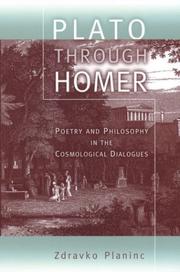| Listing 1 - 10 of 311 | << page >> |
Sort by
|
Book
ISBN: 9782864320876 2864320878 Year: 1989 Publisher: Lagrasse: Verdier,
Abstract | Keywords | Export | Availability | Bookmark
 Loading...
Loading...Choose an application
- Reference Manager
- EndNote
- RefWorks (Direct export to RefWorks)
Book
ISBN: 0691211175 9780691211176 0691211167 0691221251 Year: 2021 Publisher: Princeton, New Jersey Princeton University Press
Abstract | Keywords | Export | Availability | Bookmark
 Loading...
Loading...Choose an application
- Reference Manager
- EndNote
- RefWorks (Direct export to RefWorks)
A major new interpretation of Vergil's epic poem as a struggle between two incompatible versions of the Homeric heroThis compelling book offers an entirely new way of understanding the Aeneid. Many scholars regard Vergil's poem as an attempt to combine Homer's Iliad and Odyssey into a single epic. Joseph Farrell challenges this view, revealing how the Aeneid stages an epic contest to determine which kind of story it will tell-and what kind of hero Aeneas will be.Farrell shows how this contest is provoked by the transgressive goddess Juno, who challenges Vergil for the soul of his hero and poem. Her goal is to transform the poem into an Iliad of continuous Trojan persecution instead of an Odyssey of successful homecoming. Farrell discusses how ancient critics considered the flexible Odysseus the model of a good leader but censured the hero of the Iliad, the intransigent Achilles, as a bad one. He describes how the battle over which kind of leader Aeneas will prove to be continues throughout the poem, and explores how this struggle reflects in very different ways on the ethical legitimacy of Rome's emperor, Caesar Augustus.By reframing the Aeneid in this way, Farrell demonstrates how the purpose of the poem is to confront the reader with an urgent decision between incompatible possibilities and provoke uncertainty about whether the poem is a celebration of Augustus or a melancholy reflection on the discontents of a troubled age.

ISBN: 0826264506 9780826264503 9780826214799 0826214797 0826214797 Year: 2003 Publisher: Columbia, Mo. : University of Missouri Press,
Abstract | Keywords | Export | Availability | Bookmark
Book
ISBN: 9781108666732 1108666736 9781108491709 9781108740609 1108642659 1108491707 Year: 2024 Publisher: Cambridge: New York, NY: Cambridge University Press,
Abstract | Keywords | Export | Availability | Bookmark
 Loading...
Loading...Choose an application
- Reference Manager
- EndNote
- RefWorks (Direct export to RefWorks)
"Juxtaposing Sappho and Homer within the embrace of a non-hierarchical, "reparative reading" culture, as first conceived by queer theorist and poet Eve Kosofsky Sedgwick, this book reintroduces readers to a Sappho who supplements Homer's vision, allowing for a sustaining, collaborative way of reading both lyric and epic"--
Queer theory --- Sappho --- Homer
Book
ISBN: 0191092487 9780191092480 9780191092497 0191092495 Year: 2016 Publisher: Oxford, England : Oxford University Press,
Abstract | Keywords | Export | Availability | Bookmark
 Loading...
Loading...Choose an application
- Reference Manager
- EndNote
- RefWorks (Direct export to RefWorks)
The Iliad and the Odyssey are the cornerstones of Western literature. Over the years they have inspired artists, writers, philosophers, musicians, playwrights, and film-makers. Barbara Graziosi introduces Homer's key works and discusses the main literary, historical, and archaeological issues at the heart of Homeric studies.
Book
ISBN: 0520009835 9780520009837 Year: 1972 Publisher: Berkeley University of California Press
Abstract | Keywords | Export | Availability | Bookmark
 Loading...
Loading...Choose an application
- Reference Manager
- EndNote
- RefWorks (Direct export to RefWorks)
Oral-formulaic analysis. --- Homer. --- Iliad (Homer). --- Troy (Extinct city). --- Turkey
Book
ISBN: 1283692090 0299286339 9780299286330 0299286347 9780299286347 9781283692090 Year: 2012 Publisher: Madison : University of Wisconsin Press,
Abstract | Keywords | Export | Availability | Bookmark
 Loading...
Loading...Choose an application
- Reference Manager
- EndNote
- RefWorks (Direct export to RefWorks)
Epic poetry, Greek --- History and criticism. --- Homer. --- Homer

ISBN: 3770522230 Year: 1984 Publisher: München
Abstract | Keywords | Export | Availability | Bookmark
 Loading...
Loading...Choose an application
- Reference Manager
- EndNote
- RefWorks (Direct export to RefWorks)
Classical Greek language --- Grammar --- Homer
Book
ISBN: 1472543106 1282876163 9786612876165 1441179577 9781441179579 184706518X 9781847065186 9781847065193 1847065198 9781472543103 9781282876163 6612876166 9781441191076 1441191070 Year: 2009 Publisher: London ; New York : Continuum,
Abstract | Keywords | Export | Availability | Bookmark
 Loading...
Loading...Choose an application
- Reference Manager
- EndNote
- RefWorks (Direct export to RefWorks)
"Ulysses remains less widely read than most texts boasting such a canonical status, largely due to misunderstanding about how to read it, and this guide provides an easy to follow remedy. By showing how Joyce reacted to the historical and cultural context in which he was situated, the radical nature of his use of language is laid bare in a chapter-by-chapter analysis of Ulysses. This approach enables the student reader to read and enjoy the novel's plurality of styles and to understand the terms of critical debate surrounding the nature and significance of Joyce's novel."--Bloomsbury Publishing.
Joyce, James, --- Homer. --- Birmingham, Kevin.
Book
ISBN: 1684481341 9781684481347 1684481317 1684481368 Year: 2019 Publisher: Lewisburg, Pennslyvania : Bucknell University Press,
Abstract | Keywords | Export | Availability | Bookmark
 Loading...
Loading...Choose an application
- Reference Manager
- EndNote
- RefWorks (Direct export to RefWorks)
Finalist for the 2020 PROSE Awards, Classics section Homer’s Odyssey is the first great travel narrative in Western culture. A compelling tale about the consequences of war, and about redemption, transformation, and the search for home, the Odyssey continues to be studied in universities and schools, and to be read and referred to by ordinary readers. Reading Homer’s Odyssey offers a book-by-book commentary on the epic’s themes that informs the non-specialist and engages the seasoned reader in new perspectives. Among the themes discussed are hospitality, survival, wealth, reputation and immortality, the Olympian gods, self-reliance and community, civility, behavior, etiquette and technology, ease, inactivity and stagnation, Penelope’s relationship with Odysseus, Telemachus’ journey, Odysseus’ rejection of Calypso’s offer of immortality, Odysseus’ lies, Homer’s use of the House of Atreus and other myths, the cinematic qualities of the epic’s structure, women’s role in the epic, and the Odyssey’s true ending. Footnotes clarify and elaborate upon myths that Homer leaves unfinished, explain terms and phrases, and provide background information. The volume concludes with a general bibliography of work on the Odyssey, in addition to the bibliographies that accompany each book’s commentary. Published by Bucknell University Press. Distributed worldwide by Rutgers University Press.
| Listing 1 - 10 of 311 | << page >> |
Sort by
|

 Search
Search Feedback
Feedback About UniCat
About UniCat  Help
Help News
News